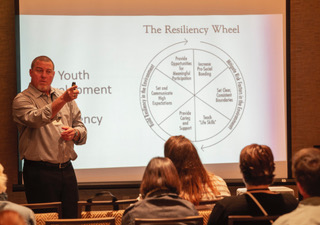Safe School Climate Certificate Program
 University of Southern California Sol Price School of Public Policy, Safe Communities Institute (SCI), offers a Trainer Certification Course (TCC) for K-12 School leaders who are interested in receiving a Safe School Climate Certificate (SSCC). The Safe School Climate Certificate program will engage participants with critical insight on emerging trends impacting a safe learning environment. The SSCC prepares educational leaders with the knowledge base, technical skills and program development methods needed to effectively establish a safe and supportive school climate for all students and staff. This comprehensive certification program goes beyond just building capacity in educational leaders, it will equip participants with the essential tools and proven strategies to increase engagement in students and effectively build a safe school climate.
University of Southern California Sol Price School of Public Policy, Safe Communities Institute (SCI), offers a Trainer Certification Course (TCC) for K-12 School leaders who are interested in receiving a Safe School Climate Certificate (SSCC). The Safe School Climate Certificate program will engage participants with critical insight on emerging trends impacting a safe learning environment. The SSCC prepares educational leaders with the knowledge base, technical skills and program development methods needed to effectively establish a safe and supportive school climate for all students and staff. This comprehensive certification program goes beyond just building capacity in educational leaders, it will equip participants with the essential tools and proven strategies to increase engagement in students and effectively build a safe school climate.
The program course topics are divided into these modules:
- Threat Assessment Planning
- School Safety Plans
- Youth Participatory Action Research (Student Voice)
- Mental Health and Violence Prevention
- Restorative Practices
- Multi-tiered System of Support (MTSS)
- Data Integration
Participants of safe school climate certificate program will learn how to:
- Target core campus issues impacting a Safe School Climate, using sources of quantitative and qualitative data to implement effective interventions.
- Utilize Student Voice as a source of program development that works alongside LCAP/ESSA, PBIS/MTSS, School Safety Plans and Mental Wellness planning for all students.
- Learn the fundamental strategies of developing threat assessment plans.
- Establish a Stakeholders network to increase community.
- Develop Site Specific School Safety Plans.
- Develop Activities that create lines of communication and build community amongst students and staff.
- School Safety planning and prevention strategies to address critical risk factors impacting safe school climate.
Objectives:
-
The SSCC will delve into the mechanism of the school action plans to implement an evidence based Youth Participatory Action Research model on a school campus.
-
This will include data integration, action planning and situational learning.
-
Participants will learn how to develop school safety plans and align student engagement programs to serves as an extension of their MTSS/PBIS initiatives.
-
Topic Specific Capacity Development – A diverse cross-section of content experts will build knowledge of specific safe school topics.
-
These topics include Youth Participatory Action Research, School Safety Plans, Data Integration, Mental Health, PBIS/MTSS, Threat Assessment, School Law Enforcement Partnerships, and School Violence Prevention.
-
Participants will learn the mechanism to utilize as part of the overall action plans.
Course Dates: Coming Fall 2025
Location: University of Southern California
Time: 8:30am to 4:30 pm Monday – Friday



